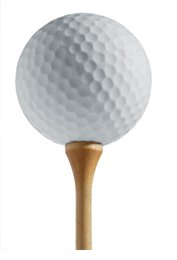Best Golf Tees Review - Plenty of Choices
The best golf tees? Plenty of choices, indeed.Back in the day, golfers
about to tee off used little piles of dirt or sand to prop up their
balls. For sure, those little heaps of sand weren’t the ideal golf tees,
but they were all the Scottish had. Well, we’ve come a long way since
then. Now we have dozens of different types of tees to choose from. It
sounds good to have so many choices, but when you’re looking for the
best golf tees having that many options can make selecting the right
type a little overwhelming.

All tees share a couple of characteristics. There’s always a slender “stake” portion that you stick into the ground, and there’s always a place on top that’s wide enough to serve as a (more or less stable) platform for a ball. I say “more or less stable” mostly because of the “brush tees” I’ll mention later.
Apart from those two common characteristics, tees can take different shapes, be made of different materials, and be different lengths. Here are some of your options when you’re looking for the best golf tees.
Simple Wooden Tees
Sometime after the Scottish stopped using their piles of dirt, simple wooden golf tees started appearing. Compared to the older method, these wooden tees probably seemed like they were the best golf tees possible.
Simple wooden tees, which even today are the most popular type, are made entirely of wood. Their design is straightforward yet elegantly effective. Typically, the top portion of the tee is just large enough to support a ball. The top is also slightly concave rather than flat, “cupping” the ball ever-so-slightly so it’s more likely to stay in position. In the minds of many golfers, simple wooden tees are not only the cheapest, but the best golf tees.
These wooden tees aren’t fancy – all they do is work. They’re available in several different lengths, and they’re very cheap: by looking around, you can buy 500 of them for less than $7. Unfortunately, they have two drawbacks: they’re fairly fragile and easy to crack or snap in half as you’re driving through the ball; and manufacturing them requires that a lot of trees give up their lives every year. Those two drawbacks are enough to make some people believe that these wooden tees, although cheap and effective, aren’t the best golf tees.
Moreover, golfers being golfers (meaning we’re constantly looking for something “better” to improve our games), companies started coming up with other types of tees. This is where things start getting complicated.
Step-Down Wooden Tees
Step-down wooden tees may be the best golf tees for people who aren’t concerned about the environmental issues (potential deforestation) associated with wooden tees, but are worried about teeing the ball to the same height every time. They feature a flange on the stake that “stops” the tee at a specific height as it is being inserted into the ground. Different lengths of step-down wooden tees provide different ball heights. Like simple wooden tees their tops are concave. Other than the environmental concern, I like ‘em. Typically, they’re more expensive than simple wooden tees but cheaper than the plastic types.
Plastic Tees
Plastic tees are far less fragile but significantly more expensive than wooden tees. Generally, golfers lose them before they break them. Like wooden tees, simple and step-down plastic tees are available in various lengths. Some environmental issues exist with plastic tees, so you may or may not think they’re the best golf tees available. Fortunately, some are made of biodegradable or recycled plastic.
Other Designs (all plastic)
Multiple other designs are also available. Here are short descriptions of only a few:
- “Zero Friction” golf tees have a 3-pronged top instead of a “solid,” concave top. The design is intended to reduce resistance between ball and tee, and thereby promote more distance. They’re made of biodegradable plastic. Some golfers think they’re the best golf tees available. I’ve used them myself and quite like them.
- “Senior Tees” feature a significantly larger “platform” for the ball. They make positioning the ball easier for people with physical challenges.
- “4 Yards More” tees have a rigid plastic stake and a somewhat flexible, “fingered” plastic top. The individual fingers and body of the top flex as you drive through the ball. The design is intended to reduce ball/tee resistance at impact and promote longer, straighter drives. These tees also feature a height-limiting flange on the stake. My husband loves them; I think they’re goofy and too expensive.
- “Brush T” tees have a unique, very flexible nylon bristle “cup” that supports the ball – sort of. This design is also intended to reduce friction and ball deflection at impact, theoretically causing longer, straighter drives. I find them very difficult to use (I can never get the ball to stay in position) and extremely expensive.
From the best golf tees to golf club reviews.



New! Comments
Have your say about what you just read! Leave us a comment in the box below.